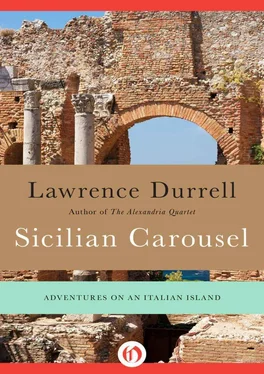Martine:
I don’t know what you will make of the quarries. Holes in the ground have always had a depressing effect upon me, and the Latomie proved no exception, specially as I wandered about them in the afternoon with a westering sun and lots of dense shadow which gives off waves of humidity. Beautiful yes, the gardens and their luxuriance. But once or twice when I found myself alone on the asphalt paths among the dense lemon groves with their great clutches of fruit.… I felt a kind of panic, a sense of urgency, a premonition of doom. Almost the desire to cut and run back, back into the warm sunlight of the open earth above. It was the original ‘panic’ sense about which you talked — but in Greece proper it is that moment of noonday when suddenly silence falls, the cicadas stop, the sea subsides, the whole of nature holds its breath. And you hear the breathing of Pan himself as he sleeps under an olive tree. We have all experienced it. It is a terrifying experience. Well, down here in the Latomie I experienced it all over again, and cried out to call the children who were clambering about in the Ear of Dionysos testing the echo. Whew! I was glad when they came running.
So Martine on the subject of these singular caves — the one we visited was precisely the Paradiso which contained the strange feature which Caravaggio is supposed to have christened The Ear of Dionysos.
Our guide, now somewhat exhausted by his long and admirable disquisition of the monuments above ground, led our loitering crocodile down the sloping ramps and paths into the Paradise Quarry where I looked forward eagerly to encountering Martine’s version of the Great God Pan. Certainly it was a little heavy and tideless as a place but there was no doubt about its singularity — one almost felt that it had been designed this way, and not just carved out in haphazard fashion by the architects who had other things in mind. It was not simply the layout of the gardens — which had an almost Turkish prolixity and richness. There was water here and shade and humidity below ground where every sort of fruit and flower flourished in a luxuriance which was really paradisical. But the actual cuttings themselves seemed somewhat artificial, in the sense that everywhere there were grottoes and caverns, pediments and columns holding up large sections of undercut ground in the most precarious fashion. It was very much after a sketch by Doré or Hugo.
But of Pan himself honestly no trace, alas; I thought it might perhaps have been the time of day — perhaps she had been down here at high noon? But no, for she had spoken of a westering sun. For my own part, apart from the luxuriance — you could see vines literally leaping up into tall green trees to dress themselves on their outspread branches — I felt most the heavy melancholy of the passages in Thucydides describing the fate of the prisoners who were once herded here. There was even a passionflower which had wound itself about a young cypress — its flowers giving the tall tree the strangest appearance. As to the prisoners, in their time these quarries must have been bare; all this luxuriance is relatively modern. In the great battle against Athens some seven thousand prisoners fell into the hands of the Syracusans; there was nowhere to put them, so they were shoved down in these ready-made cages, easy to guard. One thinks of the Mappin Terraces in the London Zoo with their puzzled-looking inhabitants. But here life was no joke for the prisoners. The historian who records the Athenian defeat in great detail — Deeds had the advantage of reading Thucydides during the Eighth Army’s advance through Sicily — made no bones about the great heat during the day, and the great evening damps which followed, particularly in the autumn with the turn of the equinox. Illness ravaged them. “During eight months the daily allowance per man per day was half a pint of water and a pint of corn,” he adds.
Later, one supposes, when the war had been won, these prisoners were either sold as slaves or used as directed labor on the new monuments which celebrated another era of peace and plenty.
The so-called Ear of Dionysos is hardly less of an enigma than so many other features among the monuments of Sicily. The echo is prodigious. And it suggested immediately the cave of the Gumaean sibyl (my guidebook told me it would). But our guide had other notions, based on the fact that the issue of the cave comes out just above the prompter’s place in the Greek theater and he seems convinced that the two things are somehow connected. The cave for him was a sort of sound box — his image is the case of a violin or the body of the cicada. As far as I could understand his notion the echo of the cave lent strength to the acoustics of the theater — but somehow this pretty theory seemed to me a little doubtful. I preferred the sibyl as a notion. But of course unless some literary reference is unearthed we shall never really be sure. For my own private satisfaction I did what one should do in sibyls’ caves — I addressed a direct question to the nymph which concerned Martine. It was to be answered if she so pleased with a yes or no, and I would count ten words along in the leading article of the daily paper on the morrow in the hope of an answer. In part it was silly, I knew that; but I am superstitious. So had she been.
Moreover, on reflection I had come to the conclusion that the panic which Martine had felt was not that of Pan but that of Persephone — the horror of the deep ground in contrast to the pure open air, the flowers and trees of our mother, the earth. All grottoes and caverns and labyrinths have this enormous brooding melancholy about them, and this huge prison with its grotesque name is no exception.
Yes, we were all glad to regain the outer air, to be liberated from that hangover-like presence of darkness and shadow which reigned below ground. When the wind swept through it the foliage shuddered and twittered — it sounded like the souls of all the prisoners who had died here, so far from baking Athens. Whatever one may say to oneself it is hard to swallow the fact of death — the blank white space that follows a name about for months and years after its owner’s disappearance. I saw the German girl Renata with her burnt-sugar tan and blonde bell of thick hair walking lightly down the paths ahead of me with her little finger linked to the little finger of her compatriot as they talked about Greek tragedy; I wished my German were better for he spoke with great animation and eloquent gestures. For my part, in searching for a definition of what constitutes the tragic element in people and situations, I had evolved an explanation which seemed to me to meet the theatrical case as well. It is not the simple fact of great beauty being wantonly, mindlessly destroyed by a cruel force called Nature. We would by now have become blunted in our feelings about the matter — the poignancy of this inevitable destruction. No. The Greeks had from early on transplanted the Indian notion of karma to Greece, and in Greek tragedy what assails us is the spectacle of a human being trapped and overthrown by the huge mass of a past karma over which he has no control. Beauty is born of the spectacle of a perfect life or a perfected action in this life doomed by something emanating from an unknown past. The accumulated weight of — no, evil is not the word — of misconduct in the pure sense which occurred far beyond the range of his present awareness. In the shadows of a past which he has forgotten and which he once inhabited under another name. The Hero’s fate is the past, the unknown past; and in watching him sink and fall under the blows of destiny we feel how inexorable is the nature of process. The satisfaction, the Aristotelian catharsis is contained in the fact that in its realization we feel we know the worst about life and death — and once you know the very worst about anything you are automatically comforted, delivered.
Читать дальше











